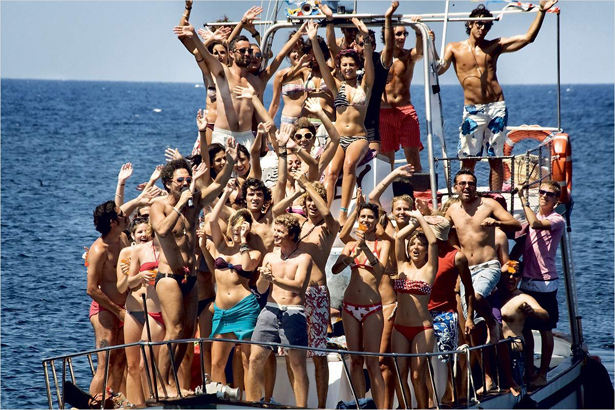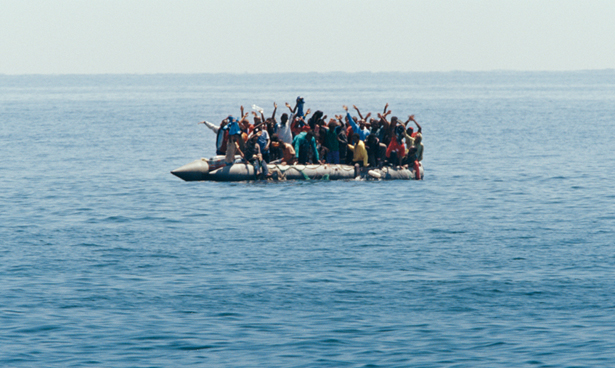These days I have roughly an hour commute time between 8AM-9AM, so I find myself spending the time listening to Italian live radio broadcast (thank you TuneIn Radio app). This is one of the blessings of broadband streaming; your views and surroundings are rooted in the US, but your real-time soundtrack is coming from elsewhere – in this case, Italy.
My journey starts at RAI 3 with their informative Wiki Radio – half hour dedicated to one topic around culture, history, politics etc. – I call it “My General Education on Wheels.” Then I switch to RAI 1 where they typically have interviews with listeners around a specific news topic. Last week’s broadcast was dedicated to the problem of illegal immigrants from Africa that hit Sicilian Aeolian Islands, including interviews from Mineo’s refugee camp.
In this film Roman director Emanuele Crialese goes back to his favorite set location – Sicily (see 2002 Respiro and 2006 Nuovomondo) – and with a post-Neorealism nod puts a giant, yet touching mirror against the problem of illegal immigrants in Sicily, and for that matter elsewhere in the world.
 Close up of happy tourists on boat busy having fun
Close up of happy tourists on boat busy having fun
The film shot on Linosa and Aggrigento in Sicily, tells the story of a humble family that tries to make a living from a dying trade – fishing, led by Ernesto (Mimmo Cuticchio), the grandfather representing old mores. Ernesto is aided by his naïf and easy-to-ridicule grandson, Filippo (Filippo Pucillo) on their fishing trips. You may remember him from 2002 Respiro. His mother, Giulietta (Donatella Finocchiaro), after the death of her husband, Pietro, wishes Filippo a better life outside the island. She occasionally comments on his heavy Sicilian dialect and the fact that he needs to speak proper Italian.
 Distant view of desparate illegal immigrants on boat, anxiously crying for help
Distant view of desparate illegal immigrants on boat, anxiously crying for help
Cinematographer Fabio Cianchetti opens the film with series of close-up underwater visuals of casting the fishing net I found very symbolic – as if to say, here is another man’s encroachment into nature in order to make an artificial order by capturing idly swimming fish. The camera then goes up above the water to portray Filippo and Ernesto on their beat-up fishing boat working hard to make a living.
Above water, there is another reality where man is also trying to make another type order. However, this time playing “the fish” are illegal immigrants that Ernesto and Filippo come across in the middle of the ocean. Since on Linosa fishermen are punished for helping illegal immigrants, their first instinct when spotting the illegal boat is to notify the coastguard, which advises them to stay at bay and wait for their arrival. But what happens next is that some immigrants jump their ship and swim towards the fishermen’s boat for salvation.
In my opinion, this is the primary scene that illustrates the entire film’s dilemma: abide by the law of the land and not help the immigrants or abide by what Ernesto call “The Law of the Seas,” which says never leave a man stranded in the water, which represents a core human solidarity. Ernesto chooses the latter.
From that point forward, the plot provides a close-up look at pregnant Sara (played by non-professional Ethiopian refugee Timnit T.) and her son – rescued by Ernesto and Filippo. Crialese offers a unique juxtaposition of the undercover attempts of the Pucillo’s family to help Sara, living in the rundown garage, while next door tourists from the North are vacationing.
In other words, two groups of external visitors to the island, immigrants that force their way in and present a threat to local business, whereas tourists that come to enjoy the pristine beaches and offer a financial breathing for islanders during the summer months.
How can you reconcile the natural instinct to help your fellow man, when the law states the opposite? is the constant conflict that drives the story forward. In this case, both islanders, tourists and immigrants – are all thrown into an unpredictable reality where ironically “terraferma” (firm land) is always there, yet highly elusive.


Very good blog post. I certainly appreciate this site. Thanks!
read and click http://v50klub.pl/top-10-most-disappointing-nfl-teams-in-2008-season-t14102.html